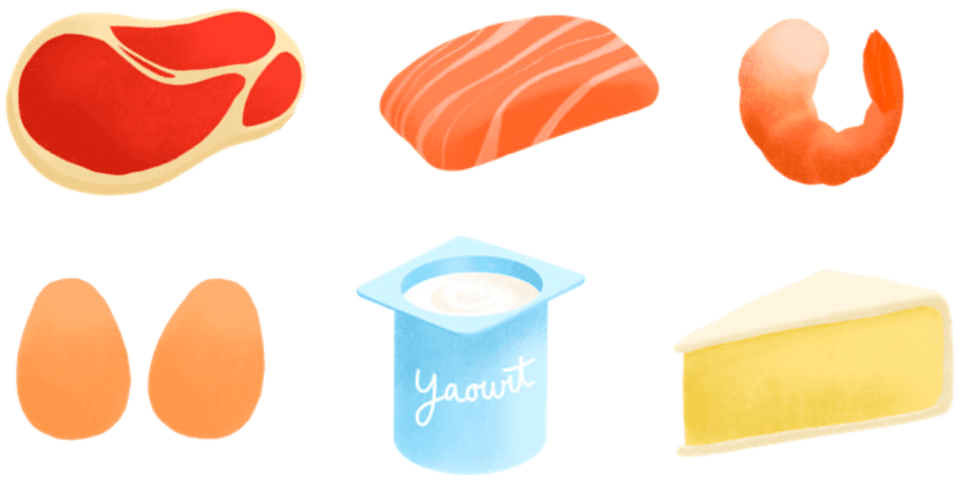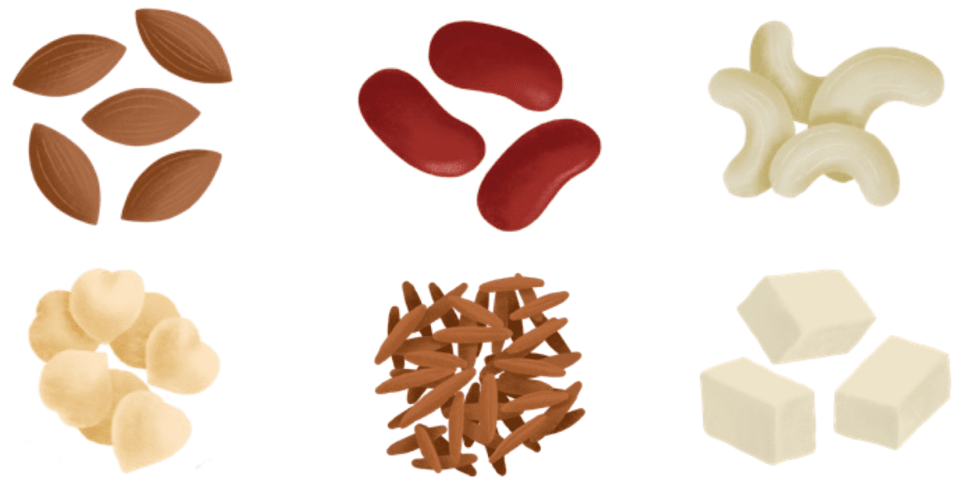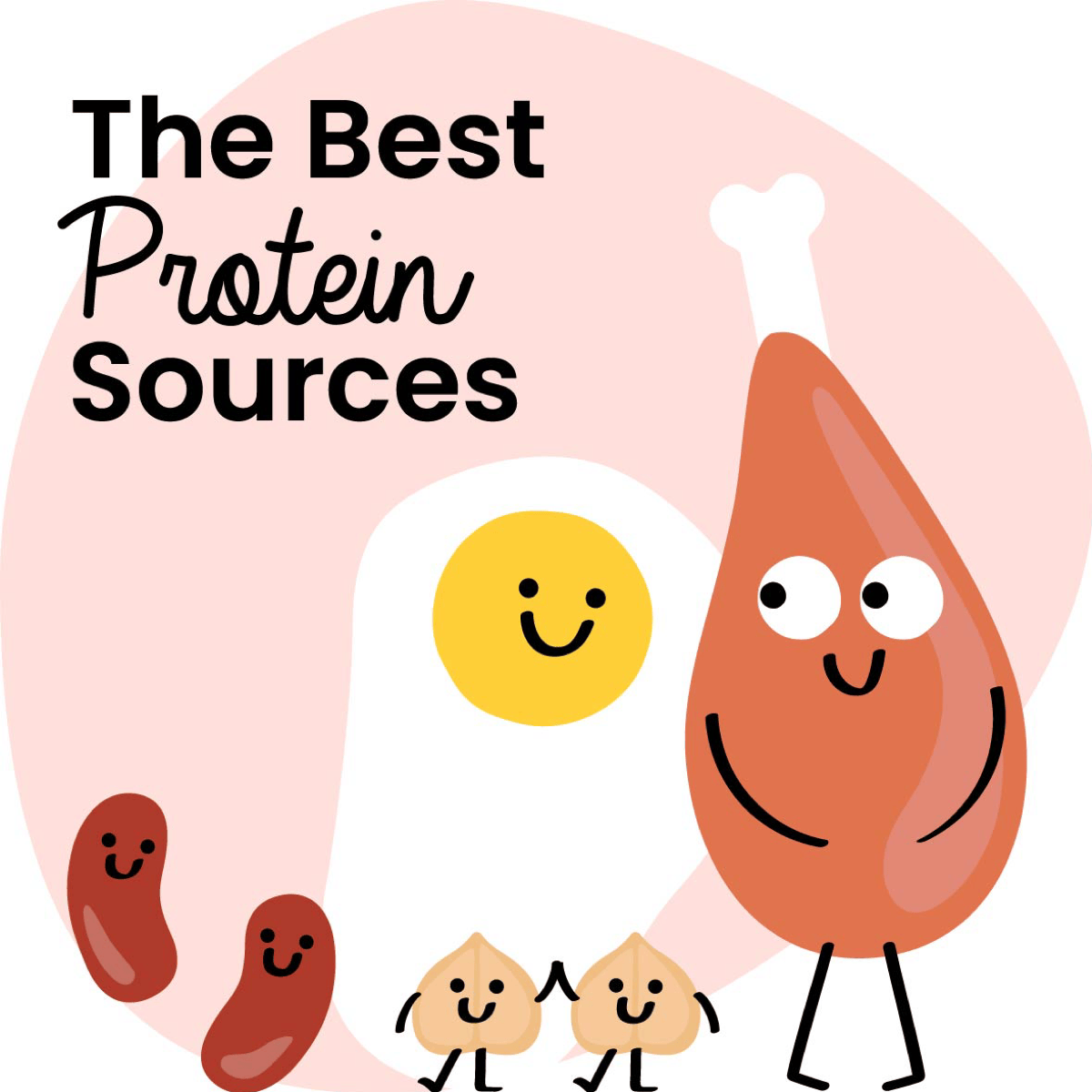The main function of protein is to help with the replenishment of muscle tissue, skin, bone matter, hair and nails. It also strengthens our immune system and protects us against illness.
Where does protein come from?
Meat is what usually comes to mind when we think about protein. Although meat is a big source of protein, there are many other sources as well, including plants.
The proteins we get from our diet can come from:
 | Animals: meat, fish, shellfish, eggs, milk and dairy products |
 | Plants: legumes (lentils, chickpeas, red beans, etc.), whole grains (quinoa, buckwheat, etc.), tofu, nuts (walnuts, almonds, hazelnuts, etc.) |
Amino acids: the main component in protein
Protein is made up of chains of amino acids, which are like mini-proteins There are 22 different amino acids:
- There are eight that are deemed “essential” for adults (nine for children) and our bodies do not know how to produce them. Therefore, we have to get these amino acids from food in the form of protein
- The others are synthesized by our body from essential amino acids and degraded proteins.
The gold standard in amino acids is the egg: it contains all eight essential amino acids in the ideal amounts. Aside from eggs, no animal or plant-based protein contains all the amino acids in the right proportions: they are too low in some essential amino acids.
That is why it is important to combine the different types of proteins to ensure the body gets the optimal ratios of amino acids.
Can you stay healthy on a vegetarian diet?
Just like animal proteins (except for eggs), plant proteins also have limited amounts of essential amino acids and some do not contain any of certain essential amino acids. But that is not a problem if a vegetarian diet combines a variety of plant-based proteins to ensure a sufficient intake of essential amino acids. It is possible to get the right combination over the course of a day, but not necessarily in a single meal. In general, combining grains and legumes makes it possible to cover all the body’s needs: polenta with chickpeas, rice with lentils, corn with red beans, etc.
Along the same lines, we often hear that vegetarians are deficient in iron, which is mainly found in red meat. But there is also iron in a lot of plant-based foods, such as lentils, chickpeas and almonds. However, this form of iron is harder for the body to absorb, so it is important to ensure it gets assimilated.
To promote iron absorption, you should:
- optimize your vitamin C content because it promotes iron absorption and
- avoid coffee and tea during and around mealtime because they contain polyphenols that interfere with iron uptake.
We consume too much animal protein
These days, we are eating plenty of protein: we do not have any quantitative deficiencies. On the other hand, we have qualitative deficiencies because we do not consume a sufficient variety of proteins. We eat too much animal protein at the expense of plant-based protein.
That is why we are frequently lacking in one or multiple essential amino acids. A deficiency in just one essential amino acid can cause fatigue, an inability to concentrate or sleep disorders.
In addition, red meat is high in saturated fat and omega-6, which are crucial fats. But we eat too much of them, increasing our risk of cardiovascular disease and cancer (see our article on fat). In 2015, the WHO labelled red meat as “likely to cause cancer in humans” (group 2A). It should be eaten no more than once a week.
As for processed meats (ham, sausage, ground meat, etc.), they were deemed to “cause cancer in humans” (group 1), in particular because of their content in nitrites (preservatives) , and they should be avoided to the extent possible.
This is why it is best to eat at least 50% plant-based protein.
- OMS : https://www.who.int/features/qa/cancer-red-meat/fr/
- Diallo A, Deschasaux M, Latino-Martel P, Hercberg S, Galan P, Fassier P, Allès B, Guéraud F, Pierre FH, Touvier M. Red and processed meat intake and cancer risk: Results from the prospective NutriNet-Santé cohort study. Int J Cancer. 2018 Jan 15;142(2):230-237. doi: 10.1002/ijc.31046. Epub 2017 Oct 16. PubMed PMID: 28913916.
- Crowe FL, Appleby PN, Travis RC, Key TJ. Risk of hospitalization or death from ischemic heart disease among British vegetarians and nonvegetarians: results from the EPIC-Oxford cohort study. Am J Clin Nutr. 2013 Mar;97(3):597-603. doi: 10.3945/ajcn.112.044073. Epub 2013 Jan 30. PubMed PMID: 23364007.
- WHO, 2007, Protein and amino acid requirements in human nutrition: report of a joint FAO/WHO/UNU expert consultation, World Health Organisation, technical report series, no. 935
- Davey GK et al. EPIC-Oxford: lifestyle characteristics and nutrient intakes in a cohort of 33 883 meat-eaters and 31 546 non meat-eaters in the UK. Public Health Nutr. 2003 May;6(3):259-69.





